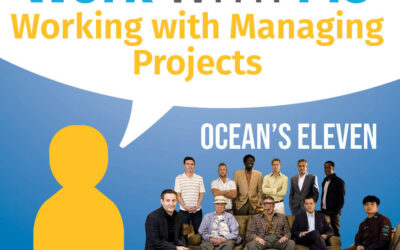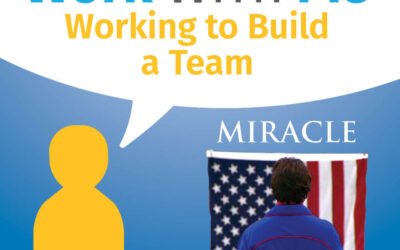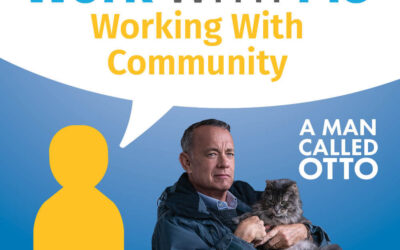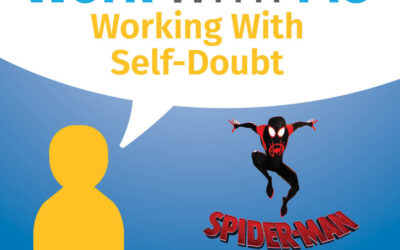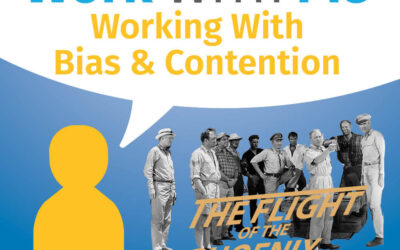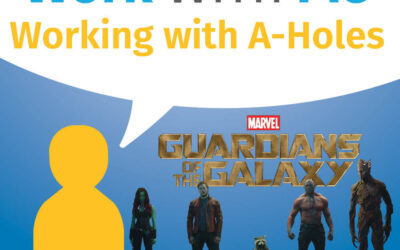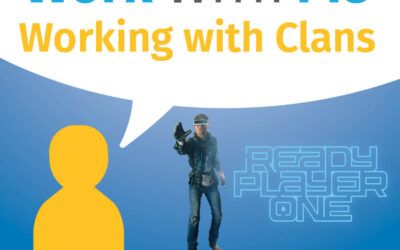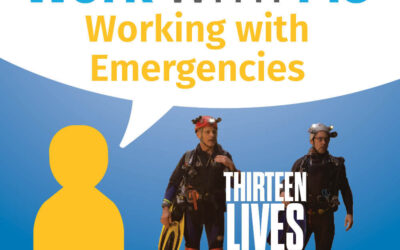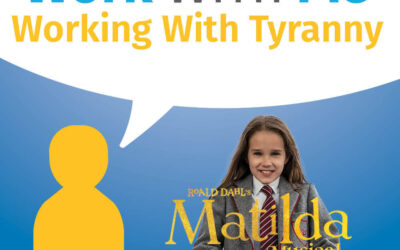Problem Solving Teams
Have you felt like there are problems lurking behind you? Problem solving can be a challenge but teams can be the most effective way to deal with problems and opportunities. What are the best ways to help make your teams effective? We talk about personality, perspective and experience clashes in Jaws (1975). (*spoiler warning*)
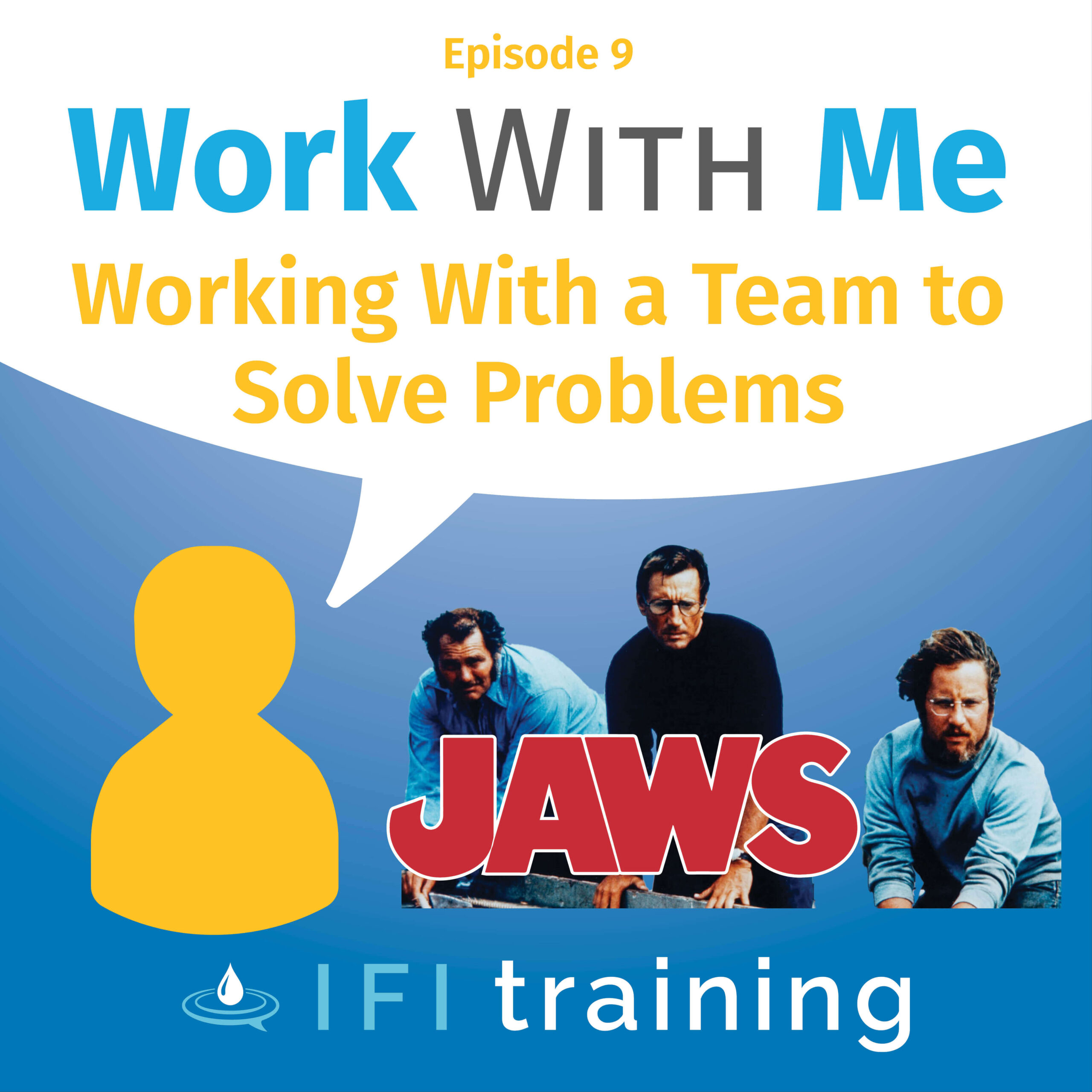
Show Notes & Resources
Learn More about the Podcast
The Work With Me Podcast is dedicated to helping you improve your workplace relationships and elsewhere. You can take the Jungle Motives personality quiz at JungleMotives.com. Please follow us wherever you listen to podcasts and rate us 5 stars.
Transcript
Intro (00:00:00)
Scott
Solving problems at work can seem really daunting and at times even overwhelming. Think of a problem that starts small but it grows bigger and bigger as it comes closer towards you. Cue the music. Dun Dun Dun Dun Dun Dun Dun Dun Dun Dun Dun Dun. You see a dorsal fin. How do you tackle problems if they’ve grown so big they may devour you?
Richard
Welcome to the Work With Me podcast, where we help you improve workplace relationships. As always, this podcast is sponsored by IFI Training. I’m Richard.
Scott
I’m Scott
Susan
and I’m Susan.
Richard
Each week we dive into media and pop-culture references using the 3D Relationships tool to better understand others and come away with actionable insights into how to solve people problems.
Scott
Just when you thought it was safe to go back to work …
Susan
Today we are going to talk about the movie Jaws. And I am super excited to talk about this movie because I watched it for the first time last week and I am old enough to have been a young teen when the movie was first released. The movie is the story about a New England beach town that makes all of their money during the summer time and their big weekend is the Fourth of July weekend. As they approach that weekend, they have a problem with someone disappearing and they find out that a shark has eaten her. Not fun.
Scott
Not all of her. I think we had the arm and elbow left.
Susan
The movie is a movie about relationships and that’s really why we chose to do this movie. It’s not the story of a town coping with a shark problem, although it is. But it’s a story about how people tackle problems, how people interact.
The Beginnings of a Problem (1:53)
Richard
The town of Amity sees, over time, this problem start to build. Chief Brody who is, Martin Brody is the main character, played by Roy Scheider, he sees this coming, I think he has some suspicions. And until he’s able to deal with the problem he wants to shut down the beaches. The mayor, Larry Vaughn, is not a happy camper about shutting the beaches down. Really, this movie begins with the conflict between these two characters. Where Brody feels like, as what will find out later that he’s a Panda Bear, meaning that primarily he’s focusing on balance—he has a very logical way of working through this problem. Secondarily, relationships are really important to him that connection, you need that connection with at least a few people but then you see the mayor come in. And Mayor Vaughn is a Jungle Cat, meaning he’s all about the control. He just wants to fix the problems that Amity is developing. And so you see this conflict developing between the two of them. What were some of the insights that you two had as you watch this movie about this relationship and how the two worked through, first, identifying what the problem was and, second, how did they get rid of it?
Scott
A couple of things. One, with the mayor being a Jungle Cat; Jungle Cats are usually pretty quick to act. I mean they are strategic, they think it through, they’re very logic-based but they don’t take a lot of time. So the mayor is ready to say everything’s good, don’t worry about it, the town’s fine. And here the police chief, Mark Brody’s a Bear, is all about balance, he wants to make sure that it’s very well-thought-out but takes a much more cautious approach. So he wants to bring in an expert that will evaluate and be able to tell truly what the problem is and how to fix it.
Susan
And you see from those two characters really a difference in what drives them. Brody is driven by safety, by maintaining the balance, by keeping everybody in a good place, whereas the mayor is driven by revenue, by controlling what’s happening in his town and he doesn’t take time to consider the impact if things go bad. It’s just, “this is the problem we’ve got to solve quick and we’ve got to be able to make the revenue that we make on the 4th of July weekend.”
Richard
It starts with Brody having a suspicion and because, especially as a Bear, he’s not going to go to bat for this suspicion that he has that maybe there’s a shark problem.
Susan
But the coroner tells him originally that it is a shark problem and then under pressure from the mayor the coroner backs off and says, “No, she was just caught in a propeller.”
Richard
The cause of death does get changed for the first victim, Chrissy Watkins. As time goes by, you can tell Brody’s still unsure. They’re sitting at the beach, all the kids are playing at the water—all the people, not just the kids—that’s when we were first introduced to Alex Kintner. It’s the first shark attack the town sees and is 100% confirmation of the problem that what they’re dealing with. So, I think there are some things that Brody could have done between the first and the second shark attack to convince the mayor, like, “Hey, let’s just pause it. Let’s just try to reevaluate some things.” He needs to come up with some really good compelling reasons why it’s in Amity’s best interest to just shut down the beach, just for a few days, just for a week before the big Fourth of July gets here, where they can evaluate. And if he had done that, Alex Kintner would still be swimming around on a beach somewhere, super happy.
Scott
Well, he’d be really old now but …
Susan
Not as old as we are.
Scott
No, not as old. Nobody’s as old as we are.
Susan
So what are some of the ways that Brody could have done a better job trying to get the mayor on his side of safety?
Scott
Remember when you’re working with Jungle Cats it’s got to be logical and it also has to reflect what’s in it for them. In this particular case for Martin Brody to have said things to the to the mayor like, “Hey, if you ever want to get elected again in this town, we’re going to have to protect the public lives first.”
Susan
Right at the gut, right? Attack him right where it hurts him ‘cuz politics is his life. Another approach that I thought about is that maybe you could have told the mayor, while keeping the emotion in—because shark attack is an emotional thing—you could take that feeling and, “What are people going to feel about our town for years to come if we become known as ‘the beach where the sharks attack’?”
Scott
If I were Brody, of course I’m a Horse, and so if I were Brody, I probably would have said, “Okay, Mayor, as long as you’re the first one in the water and you’re the furthest one out.”
Richard
That’s actually a really good line. I like that. I am a Bear and I’m actually a Panda Bear, just like Martin Brody is. And I think I could do that. I think I could say that. And it’s hard ‘cuz, again, from what we understand he still fairly new to the island. He’s still probably getting used to the dynamics of working with the mayor and of that relationship, but if you can push that, I think you’re going to see much better results. And it’s funny, ‘cuz just a little bit later on in the film you see the mayor come up to all the beach goers, to this couple, and he says, “Why aren’t you in the water? Why aren’t you swimming?” And the guy comes up with a totally bogus reason of like, “I’m just tanning.” And you can see that neither of them are willing to say that they have this—
Scott
“I don’t want to get eaten by a shark.”
Richard
Exactly neither want to say that they have this fear of getting eaten by a shark but they do.
Scott
Isn’t it funny though, that the mayor isn’t even… is fully clothed, right? He’s not even in swim gear so you know he’s not going to get in the water. And Mark Brody, kind of a back story which is interesting, is he’s known on the island as an island sheriff who is afraid of the water. So he doesn’t like the beach, he doesn’t like swimming, he never goes in the water. Apparently he almost drowned as a kid so that’s part of the backstory. But Martin Brody is obviously more cautious for a lot of reasons, not the least of which is he’s a Bear, right? So he’s about balance and he’s going to take a measured approach.
Starting to Work Through the Problem (8:01)
Susan
There’s something else here because they don’t deal with the problem when it first occurrs. They could have gone back to city council, Brody, just a couple of people, they could have been reasonable about it. They could have evaluated, made some decisions. But they let it go for a couple of days and then the town finds out about it and when that city council meeting happens it’s not an environment that’s easy to solve problems in. Sometimes we let the problem just kind of exist, hoping it will go away or solve itself and there’s a strong lesson here for, “get the best out of people when you attac the problem as soon as you possibly can.
Richard
And to be fair there wouldn’t be a movie, or it would be really poor movie. if the problem had just gone away, which sometimes does occur. That’s the watchful waiting, or patiently waiting, is not necessarily a bad approach as long as it’s made intentionally and with the proper safeguards in place. But back to your point, Scott, you do see the mayor wearing a suit and that could be something that he would have done anyway. He’s maybe just not a beach guy or he’s got this image—especially as a Jungle Cat, they like to maintain this image, right? Of, “hey, this is our proper mayor and he’s always out there doing this heroic mayor thing”—
Scott
He’s got a jacket and a tie, too, right? And it’s on the 4th of July, so…
Richard
So, it could be his normal course of action. But when there’s a problem like this and you need to lead, he should change that action. And he should be the one out in the water as deep as he’s willing to let anybody else go.
Scott
I love, Susan, your thought. Look for problems early. Try and spot them. Anticipate what are the problems that might come up in your business, whether its supply chain or whether it’s economics or who thought Covid? We didn’t see that one coming. But if you’re a beach town, I’m thinking in New England, sharks might be on your list of potential problems. So if you can identify it early and already have an action plan so that the problem doesn’t get blown out of proportion and people are… you fan that flame of emotion and then reason kind of gets chucked out the window.
Richard
And Brody, especially as a Bear, is well-equipped as a newcomer onto the island to be able to put one of those together. He could have asked questions and could have tried to anticipate some things and even if somebody says, “We never even seen a shark that close to here—although there’s this kind of strange guy who lives down by the docks and he’s always catching sharks—but maybe that’s something to consider.”
Scott
I love Brody’s eventual action item of, “let’s bring a marine biologist in.” So they bring in Matt Hooper, who is played by Richard Dreyfuss and this is a… I love the dynamic between the two of them, where Hooper is a marine biologist, he’s a Monkey, right? He’s in it because he absolutely loves sharks, I mean, loves all marine beasts but sharks most. He loves sharks. He gets really excited about sharks. So he’s the one that comes in and looks at the autopsy results and looks at the remains of poor Chrissy and, “Yep, definitely. That’s not only a shark but it’s probably a great white shark that’s a giant shark.” So this isn’t a small thresher, this isn’t a bull shark or nurse shark. This is big. That’s when they know they have, not just a problem but an enormous problem literally and figuratively.
Richard
Quint does show up when they’re having this big town meeting trying to figure out what they should be doing before Matt Hooper gets there. They could have had Quint go shark hunting. But he’s he’s above the fray of all the local townsmen renting boats and dynamite and guns and going out to try to catch the shark and …
Scott
To try to blow up the shark
Richard
So he kind of stays it above that fray. He knows that he’s more valuable. I think you see is Jungle Cat come through because he has way more shark hunting experience than anyone on the island by far.
Scott
That’s your character Quint, played by Robert Shaw. His wife loved the notion of him playing this crusty seamen who goes out, kind of this Ahab-ish character that goes to hunt the great white shark.
Richard
They did have an opportunity to help him work through that problem earlier on in the film and he probably could have, as a Jungle Cat, gone toe-to-toe with Mayor Vaughn to help them work through those resources, if they had been willing to work through that problem with him.
Scott
That’s a great point. Find people that can put on the skin or are the personality of the person you’re dealing with. You’re not going to appeal to the mayor’s emotional side ‘cuz he probably doesn’t have one. So you’ve got to go out and from the logic standpoint and who best to do that then another Jungle Cat? So Jungle Cat on Jungle Cat, mano a mano, that would have been a nice convincing way to get the mayor to suspend beachgoing until they had taken care of the problem. One small note that the… this is a small cast. So they basically had three main characters with the Mayor coming in and then the chief Brody’s wife, played very nicely, and she is a Horse, very much about the relationships and the connection. So she brings the young Hooper in to a nice sit-down dinner where they bond over previous experiences. But primarily you’ve got the three main characters and the last half of the film really is about Brody and Quint and Hooper going on the great white shark hunt.
Different Approaches and Perspectives (14:13)
Susan
It’s interesting how the three different characters approach this hunt. You have Quint who is just going to go get him the shark. He knows how to do it. He has had the experience. He’s in total control. It’s his boat, he’s going to go make it happen. You have Hooper who intellectually knows and he’s had some experience with this but he knows the book knowledge. He’s studied sharks. He knows the things that need to happen and he comes with all his fancy equipment. He’s got the shark cage. He’s got his scuba gear. He’s going to make things work. And you have Brody who gets on the boat only out of the sense of obligation. He knows it’s the right thing to do and he’s there to make sure that it happens. They get out on the boat, they start looking for the shark and they’re just some really interesting things that happen that play into what happens when you bring people together and do a situation and also show what life experience can do for us when we start … when we start dealing with problems. I’m totally intrigued at the two different shark experiences that we see from Hooper and Quint.
Scott
So before we get to the scar sharing experience, you do have this wonderful play between Quint, the Jungle Cat, and Hooper, the Monkey. And what makes this interesting, I think, is not just a personality but also their perspective. So in our vernacular we have a tool called Herds and a Herd is a perspective on how you form relationships, how you think and communicate with others
Susan
—including how you process information.
Scott
And so Matt Hooper—the young marine biologist is Third/Fourth Herder, so much more progressive likes, the technology, very affable as a Monkey. And you’ve got Quint, who is the salty old sea dog, literally, and he is a Second Herd perspective. I’m a Second Herder, and that means that we like traditional ways of doing things. We shy away from technology. He’s got these old carbine rifles that he still has on board and he’s all about the old method of fishing, right? Line in the water, you chum you try and catch something and then you kill it and maybe eat it.
Richard
You also see that in the different boats that they have. And it’s really fun to look at the Perspective mixed with the Personality that they have when you look at the boats. As a Second Herder, Quint has got the sturdy ship. Whatever problem he has with the boat, he can handle it just fine. It’s old, it’s been through its rounds with the sea but he totally trusts in that boat.
Scott
Not sure the Orca would be considered… well, maybe it is. It’s sturdy but it’s certainly not state-of-the-art.
Richard
But as a Second Herder, he doesn’t want state-of-the-art.
Scott
No.
Richard
He wants something that is tried-and-true and he knows how to totally disassemble and reassemble that engine, he’s totally fine with that. Hooper on the other hand does have everything state-of-the-art and again you see his personality comes through. He’s going to put probably thousands and thousands of dollars into getting the best equipment, the highest tech radar, the best shark cages, he’s got all these different, not just tools, but this boat that is super decked out and I would imagine was state-of-the-art for the time. He trusts this technology where, even though Quint is Jungle Cat and very logical and he’s got this Monkey streak in him, but that Herd (Perspective) as a Second Herd person, he’s more willing to trust in the boat because he’s used it over the years and is comfortable with it, over the years it’s been proven and maybe less sure of this technology that Hooper is willing to trust in.
Susan
And you have to love the scene where they show all of the shark jaws in his home. When they go to see Quint, which is its evidence that he has caught shark after shark after shark after shark after shark on that boat. He knows that the boat will get the job done. It’s worked over and over again and those shark jaws are evidence of that.
Scott
Very elementary in his problem solving, right? As a Jungle Cat and a Second Herder, they trust, both of those, really trust in their own power, maybe power’s not the right word, but you trust in your own abilities and you trust in what has been tried and true for you in the past rather than in trying new methods and getting fancy—just basic.
Conflict in Problem Solving (19:14)
Richard
We see a huge personality conflict on top of the perspective conflict between Hooper and Quint. How do their personalities shape this conflict and maybe get in the way of them solving this problem?
Scott
Some speculate that Shaw wanted to drive Richard Dreyfuss and so he needled him. When they had all of these delays—it was the first film to ever be filmed on the open ocean—they had tons of problems getting it filmed. Bruce, the mechanical shark, kept breaking down and Scheider, as a I think he was a Bear in his natural life, he just roll with it. He sat back and loved just watching the whole process. He had a great relationship with everyone but Shaw and Dreyfuss just went at each other. And Shaw may have done that to get the best performance out of Dreyfuss. That’s interesting because Jungle Cats don’t mind pushing buttons. They’ll do whatever it takes to get the job done. Monkeys are very charismatic, very spontaneous and certainly Dreyfuss was that in character in the movie and the ribbing just was legendary for on set. Apparently they hated each other until the day Shaw died.
Susan
So let’s talk about the characters and what their relationship means. Quint would have been happy if he could have just gone out and just dealt with the shark on his own, of course he would never have come back but that is beside the point. Hooper wants to be a part of this, he’s excited about getting this shark. He believes that that there’s a problem and this problem needs to be solved and he thinks his knowledge will help make that happen. Quint sees him as a lightweight, as a kid who got everything that he ever wanted because his daddy paid for it and there’s no respect there. And you see Quint just control everything that’s happening and oddly enough or interestingly enough, Hooper takes most of that. One of my favorite scenes in the whole movie is when they start to compare scars and they’re talking about their physical scars. And they start showing their wounds and their war wounds and that go in that scene, they go from really not liking each other to building respect. And it’s interesting that they use scars to do that. When you look at the the experiences in life, if you have impact experiences you have two choices— (1) you can allow that experience to fester and cause problems and eventually become a scar or (2) you can allow that problem to become a building block where you work through it, where you grow, where you take that experience and use it to do something useful. And we see Quint who had a horrible experience during World War II and was left in the water for days and saw a lot of his buddies-
Scott
Eaten by sharks on the USS Indianapolis that was torpedoed
Susan
And so his decision, his life decision is that he’s going to kill as many sharks as he possibly can. You have Hooper who has an experience with the shark when he’s 12 years old: his dad gives him a boat, he goes out fishing, he ends up catching a shark who literally eats his boat. His response is to learn about sharks since he wants to know them and to understand them. Two completely different approaches to experiences with sharks.
Scott
And that’s part of our Spots & Stripes tool, our character tool, where you have experiences—everybody has experiences. Getting people to talk about their experiences is an important way of bonding or forming healthy relationships. One of the things that those, so, Susan, you call them impact experiences—most experience as we have in life, whether you’re eating hot dogs for lunch or whatever don’t affect you on a permanent basis. But we do occasionally have very traumatic experiences in life and how we deal with those is is what sets up whether that becomes a scar or a building block. Building block, you become healthy like Hooper who becomes a marine biologist. Quint probably not so healthy, where that becomes a scar that actually clouds his judgment later on in the film when he should be making rational decisions and thinking things through he chucks all of that out the window because this has become a scar that he can’t get over.
Solving Big Problems (24:02)
Richard
When you say that Quint is an Ahab-like character, that’s exactly why. He has this obsession that he can’t let go. Who knows if shark hunting was part of his career or was just something that he did on the side, all the same, we do know it was an obsession for him. And he was extremely competent at catching the sharks, at least the smaller ones he had no issue with, and sometimes those experiences can actually undermine our ability to solve the big problems once they come up because he totally underestimated it. And when they realize that it was the 25 footer, all 3 tons of the shark, that Brody was almost pleading, “hey, we need a bigger boat.”
Scott
[Chuckles] “We need a bigger boat.”
Richard
“Let’s get back to shore. Let’s deal with this problem the right way.” Quint’s experiences maybe led to him overestimating his ability to handle a 25-foot shark.
Scott
Well and you also see the scar when he says… and it was the first moment I thought, “Uh-oh,” in the moment that he makes the proclamation that he will never wear a life vest, right? So that’s when you know, “I’m not I’m not ever going to wear a life vest.” Why would he say that?
Susan
‘Cuz he’s going to defeat the sharks or let them … or he’s not going to stay around for the battle.
Scott
Not the healthiest approach. That’s a funny scene—comparing the wounds, trying to best each other. Chief Brody, as Hooper and Quint are comparing scars, all of these battle wounds, and Chief Brody has one. He has one on his stomach that he doesn’t say anything about. As a Bear, “I’m not going to call attention to it.” Maybe that’s because that’s also was a scar maybe that’s where we don’t know but maybe that’s where he got his fear of drowning from, but he chooses to ignore it, not put it into the onto the table and let others talk about it. Some people are very private and especially with those kind of impact experiences, whether it’s a building block or scar, getting people to talk about mostly the scars, right, people will talk about the building blocks but if it’s still scar you’re not going to get them to open up about it for the most part.
Susan
There is a time that you want to get information out of your Bears. Bears that are observant, they’re watching what’s happening in a lot of times. A Bear can help you get to a core problem, what’s really causing something to decay, something to fall apart, something to not work right, you probably have to do some work to bring them into the discussion or to get the information out of them. It’s worth that effort. They are not going to volunteer it. They’re not going to become a party to the “whose scar is bigger battle” that’s going on. At the same time that “whose scar is bigger battle” is creating respect between the Jungle Cat in the Monkey and they are better able to work together because they have that experience. So it’s important to understand how different people will respond differently to the same situation and you have to use a variety of approaches, a variety of tools, if you want to get the best results for your business, for your life.
Richard
I think it’s especially important for teams to know all the cards that they’re playing with because you see this lack of communication, these assumptions and snap judgments that are made that prevent Quinn from taking some good advice and probably prevent Hooper from going about giving advice in a way that would be more beneficial to their overall objective of stopping the menace of Bruce, the shark.
Susan
You k now, Hooper doesn’t even, he’s got a drug, he knows there’s a problem with how to administer it but that solution exists from the minute he gets on the boat they don’t even talk about it ‘til the boats half gone.
Richard
They could have saved thousands of dollars and probably Quint’s life if they’d worked through this solution, using the poison instead of having to, do something that has been myth-busted and is over-the-top ridiculous, of shooting an air tank so that it makes the shark explode.
Scott
No, wait. That’s totally true. They wouldn’t have put that in the movie if it’s—
Susan
No here’s the thing. Movies are not generally realistic.
Scott
What?!
Susan
I’m curious if anybody saw any other things that prevented the solution to the problem in the movie.
Taking a Step Back (28:29)
Scott
So the first thing you do when there’s a mechanical problem is take care of the mechanical problem before you push it to the limit. When Quint wants to take the shark into shallow water and the engine starts smoking … when you see the signs of cracks in a team or when you see problems start to heat up where individuals aren’t coping very well, you’ve got to step back and maybe that’s a case word some distance or some time needs to come into play so that when you re-engage in the problem you’re fresh and you’ve got a good perspective. Don’t do it when your emotions are at a high. One of the first things we teach in Negotiation Skills: if you’re too close to it, back off. Let a little time pass so that you approach with your emotions in check and you’re making sure that you’re making rational decisions.
Susan
I love that and another piece of that is when you see the smoke deal with it. We had an experience where we were teaching a workshop. Scott and I were in, we were working with a group and Scott came to me and he said we have a problem with so and so. Well, I knew we had a problem because he had come up to me before the workshop started and told me we had no business being there, that we had nothing to offer. It was really not a good situation and I just thought, “well, if we just ignore it, it will be okay.” Scott said, “no, we’ve got to deal with it.” So neither of us dealt with it. And the second day of the workshop, he said something, it blew up, it was really ugly. And it was a huge lesson to me that when you see the potential for something to blow up, it’s time to deal with it. You can’t ignore it. And we see this throughout the movie Jaws, right? We see it on the beach initially with the shark attack, we see it not dealing with the problem, we see it with the Mayor trying to not look at what was inside the first shark that they catch, we see a lot of evidences of people just trying to gloss over the problem. You can do that but in the end the problem’s going to just fester and get bigger. Deal with it. The boat the engine dies and it’s really hard to paddle a boat that size.
Scott
And by the way, one of the lessons we learned is, if it’s a person, a problem person, take them aside. If we had dealt with that not in the group training session but had pulled him aside on a break and dealt with it one-on-one, that wouldn’t have blown up and caused the entire class to respond.
Review (31:21)
Richard
So, just to review a few of the things we’ve learned today and maybe how it can improve your relationships at work: first of all, if there is a problem that you see, deal with it immediately. The sooner we deal with problems the more likely we are to be able to come up with a solution to address them. Secondly, look at the diversity of your team. We want you to be able to use 3D Relationships to look at all dimensions of somebody’s ability to tackle a problem. Look at their previous experiences. Are they helpful or are they hurtful in finding solutions to the problem? Look at their Personality. Are there personality conflicts that might be a hindrance to your team solving the problem? And maybe take advantage of great relationships where they work well together to utilize their experiences and strengths to solve the problem. And lastly, don’t forget Perspective. People bring different sets of tools in to different situations and some of those will be right and some of them won’t be right. So, can you work with your team to find those things. Thank you so much for listening to this episode of the Work With Me podcast. You can get show notes or contribute to our discussion on the Work With Me podcast page at IFItraining.comwork-with-me. My wife loves the week of sharks. Let us know what your favorite selachimorpha is on any of our social media pages.
Scott
Remember, it’s an ocean out there. So make relationships work for you



















